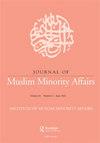“他把我看作他的财产,认为他可以为所欲为。”在荷兰的摩洛哥婚姻移民妇女的受抚养人逗留和伴侣暴力
IF 0.4
0 RELIGION
引用次数: 1
摘要
伴侣暴力,包括身体暴力、心理暴力和性暴力,在荷兰是一个问题,就像在世界各地一样。受这些形式暴力影响的一类特殊妇女是婚姻移民;这一群体在移民到荷兰后的头五年尤为脆弱,因为他们依赖伴侣获得居留权。本文基于对荷兰摩洛哥妇女的定性研究,考察了这一妇女群体的地位,并分析了依赖家庭在伴侣暴力中所起的作用。在荷兰,一场“男女关系文化化”的进程正在进行,针对移民夫妇,尤其是穆斯林夫妇。男女关系和对妇女的暴力行为是参照伊斯兰教或诸如“群体文化”、“荣誉和耻辱”等文化概念来解释的。在本文中,我们讨论了周围社会的法律法规如何发挥重要作用。本文章由计算机程序翻译,如有差异,请以英文原文为准。
“He Sees Me as His Possession and Thinks He Can Do What He Wants.” Dependent Stay and Partner Violence among Moroccan Marriage Migrant Women in the Netherlands
ABSTRACT Partner violence, including physical, psychological, and sexual violence, is a problem in the Netherlands, just as it is all over the world. A special category of women who are affected by these forms of violence are marriage migrants; a group that is particularly vulnerable in the first five years after migration to the Netherlands because of their dependence on their partner for residence rights. This article, based on qualitative research among Moroccan women in the Netherlands, examines the position of this group of women and analyses the role that dependent residence plays in partner violence. In the Netherlands, a process of “culturalization of male-female relationships” is going on, for migrant couples, especially for Muslims. Male-female relations and violence against women are explained by reference to Islam or cultural concepts such as “group culture”, “honour and shame”. In this article we argue how legal regulations in the surrounding society play an important role.
求助全文
通过发布文献求助,成功后即可免费获取论文全文。
去求助
来源期刊

Journal of Muslim Minority Affairs
RELIGION-
CiteScore
1.40
自引率
0.00%
发文量
31
期刊介绍:
Journal of Muslim Minority Affairs is a peer reviewed research journal produced by the Institute of Muslim Minority Affairs (IMMA) as part of its publication programme. Published since 1979, the journalhas firmly established itself as a highly respected and widely acclaimed academic and scholarly publication providing accurate, reliable and objective information. Journal of Muslim Minority Affairs provides a forum for frank but responsible discussion of issues relating to the life of Muslims in non-Muslim societies. The journalhas become increasingly influential as the subject of Muslim minorities has acquired added significance. About 500 million Muslims, fully one third of the world Muslim population of 1.5 billion, live as minorities in 149 countries around the globe. Even as minorities they form significant communities within their countries of residence. What kind of life do they live? What are their social, political and economic problems? How do they perceive their strengths and weakness? What above all, is their future in Islam and in the communities of their residence? The journal explores these and similar questions from the Muslim and international point of view in a serious and responsible manner.
 求助内容:
求助内容: 应助结果提醒方式:
应助结果提醒方式:


